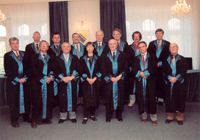 What is the Human Rights Chamber? What is the Human Rights Chamber?
The Human Rights Chamber is a judicial body established
under Annex 6 to the General Framework Agreement for Peace in Bosnia and Herzegovina
(Dayton Peace Agreement).
What is the mandate of the Chamber?
The Chamber has the mandate to consider alleged or apparent violations
of human rights as provided in the European Convention for the Protection of Human Rights and Fundamental
Freedoms and the Protocols thereto, and alleged or apparent discrimination arising in the enjoyment
of the rights and freedoms provided for in the Convention and 15 other international agreements
listed in the Appendix to Annex 6. Particular priority is given to allegations of especially severe or systematic violations,
as well as those founded on alleged discrimination on prohibited grounds.
Who may submit an application to the Chamber?
The Chamber may receive applications concerning such human rights violations directly from any Party to
Annex 6 or from any person, non-governmental organisation or group of individuals claiming to be the victim
of a violation by any Party or acting on behalf of alleged victims who are deceased or missing.
What is the jurisdiction of the Chamber?
The Chamber may only receive applications concerning matters which are within the responsibility of one of
the Parties to Annex 6 (the State of Bosnia and Herzegovina, the Federation of Bosnia and Herzegovina and
the Republika Srpska), and which occurred or continued after entry into force of the Dayton Peace Agreement
on 14 December 1995.
Who are the judges of the Chamber?

The Chamber is composed of 14 members. Four members were
appointed by the Federation of Bosnia and Herzegovina and two by the Republika Srpska. The remaining eight members are
internationals and were appointed by the Committee of Ministers of the Council of Europe. The President of the Chamber,
Ms. Michèle Picard, a French national, was designated by the Committee of Ministers of the Council of Europe
from among the international members. The members appointed are all distinguished lawyers and bring to the Chamber
a wide variety of experience in different backgrounds including the judiciary, the academic sphere, private legal practice,
administration and politics, and international, criminal and human rights law.
What are the criteria for accepting or rejecting an application?
Under the terms of Annex 6, when the Chamber receives an application it must decide whether to accept or
reject it, taking into account a number of criteria listed in Article VIII. These criteria include: (a)
whether effective remedies exist, and the applicant has demonstrated that they have been exhausted and
that the application has been filed with the Chamber within six months from such date on which the final
decision was taken; (b) whether the application is substantially the same as a matter that the Chamber has
already examined; c) whether the application is incompatible with the Human Rights Agreement, manifestly
ill-founded, or an abuse of the right of petition; and d) whether the application concerns a matter currently
pending before another international human rights body or another Commission established by the Dayton Peace
Agreement.
What are the Chamberís procedures?
The Chamberís procedures
are modeled on those of the European Court of Human Rights. Unless the Chamber decides
at the outset that an application is inadmissible or should be struck out, written observations are
requested from the applicant and respondent Party, after which the Chamber deliberates and decides on a
case. In addition to the written procedure, the Chamber may decide to schedule a public hearing for oral
argument by the parties and submission of evidence by witnesses and experts. The Chamber may also invite
written or oral amicus curiae submissions. If the Chamber finds a violation, it may, in its written decision
on the merits, issue an order indicating the steps that the respondent Party must take to remedy the breach,
including orders to cease and desist or grant monetary relief. At any stage of the proceedings, it may also
order provisional measures or attempt to facilitate an amicable resolution based on respect for human rights.
How are the Chamberís decisions implemented?
The decisions of the Chamber are final and binding and the respondent Parties are obligated to implement
them fully. Chamber decisions on the merits are forwarded to the Organization for Security and Co-operation
in Europe (OSCE) and the Office of the High Representative (OHR) for monitoring of compliance.
How you can contact us:
|